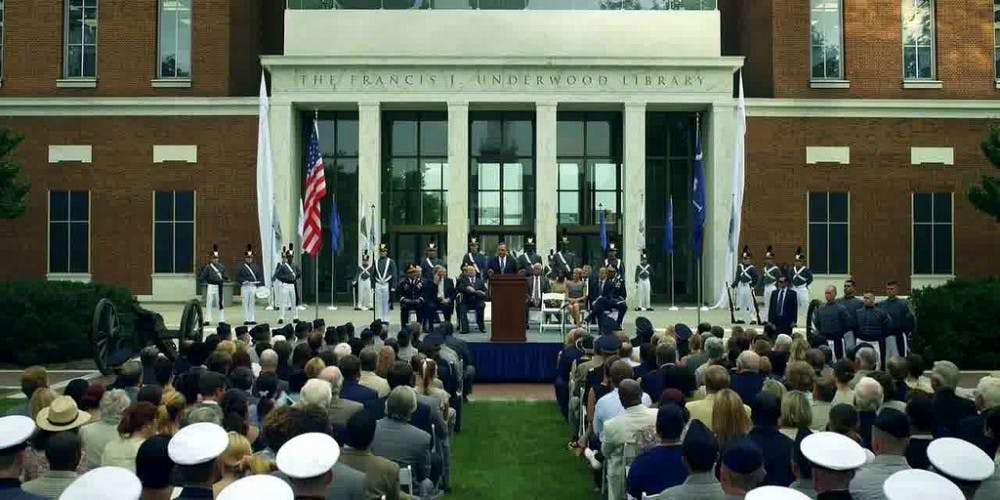House of Cards is known to the public as one of the shows that made bingeing easy. Ever since its release in 2013, Netflix has managed to keep up with the American political arena in a manner that always has viewers smiling wearily at the screen. It’s not hard to understand why: House of Cards takes current events, twists them slightly so as not to directly reference them, then adds the right amount of darkness needed to achieve its goal—that is, emphasize how corrupt the people who run the world are. The latest installment didn’t disappoint: both in the real and the fictional realms, things are dramatically different as compared to last year. “It’s amazing how ready people are to be afraid,” says Frank; the terror that’s slowly creeping its way into our daily lives was masterfully depicted in the fifth season, which is perhaps the show’s gloomiest yet.
Even though the Underwoods run the show, as they always have, there’s an obvious shift in the power dynamic. House of Cards is known for frequently breaking the fourth wall so as to connect with the audience, but this device has been employed by Frank only. The fifth season’s first episode opens with a very bold, imposing Claire staring directly into the camera. Although, as we discover later, she’s merely in the process of filming a PSA—therefore not technically addressing us, regular viewers, as we might’ve thought. If you’ve been paying attention to the creators’ technique in the past, you might guess that the “error” is not coincidental.
While Frank’s professional ascension throughout the past seasons has been impressive, season four proved to us that he is but half of a whole: without his feminine counterpart, his powers diminish visibly. Season five, on the other hand, shows us a side of Claire that is power–thirsty to the point where it’s terrifying. The tables have turned; she’s not the one supporting her husband anymore, but the one being supported. That is, until she gets it her way and no longer requires that backing, which in the end leaves Frank at her mercy.
However, it wasn’t Claire’s rise to power that shocked the audience. The show begins with an election, and this is where House of Cards (HoC) proves to be worryingly prophetic: although the writers of the show insist that everything was mapped out long before November 2016, some events bear an uncanny resemblance not only to the presidential election, but to Trump’s term as well. The most recognizable is the travel ban that Frank implements in response to ICO, HoC’s very own version of ISIS. Then, of course, there’s the attempt to rig the election by means of hacking. Lastly, there’s the Congress’s hope to impeach Underwood after investigating him with the help of the FBI.
While the viewers may find entertainment in comparing and contrasting the two worlds, there are undeniably several aspects that HoC still doesn’t get right—and with the recent departure of the show’s creator Beau Willimon, these errors are made even more apparent. Take, for example, the show’s interpretation of its politicians’ proficiency—if that’s what you call one’s ability to hide his or her true (Machiavellian) colors. Given the ethical slum that both the White House and the Capitol seem to be in, it’s incredible how dignified everyone manages to appear. While Trump’s notorious for boasting about his dubious undertakings, what makes Frank a key manipulator is his ability to keep his mouth shut. Then, the only way in which press secretary Seth Grayson resembles Sean Spicer is that they’re both ostensive opportunists. Otherwise, Seth is a master of his trade—just like Spicer would be, if his trade involved gaffes.
House of Cards once again draws its entertainment value from the world’s most compelling display of power moves. However, unlike the previous seasons which clearly and intentionally exaggerated political plot–twists, with this one it unfortunately seems like life imitates art: ever since it came out, both regular viewers and critics have expressed their amusement on Twitter, commenting on how Trump’s cabinet could have been inspired by the show. Indeed, while Obama once said that people might be amazed at how “boring” a regular day in the White House was, everything that happened in the US ever since Trump’s inauguration seemed, in theory, more implausible (and thus spectacular) than the storyline of the show. Perhaps this is why the producers resorted to appropriating some soap–opera elements in order to render the fifth season entertaining: the absurdist take on politics is no longer enough to shock. This prompted a lot of critics to call this season HoC’s dullest yet—in fact, it’s almost boring.
In comparison, real–life media outlets currently provide much more entertainment. The public is now used to the eccentric displays of power that have been, until now, a matter of the fictional. We live in a world where the demand for showbiz is satisfied the minute you turn your TV on—even when you’re watching not a show but the news.

